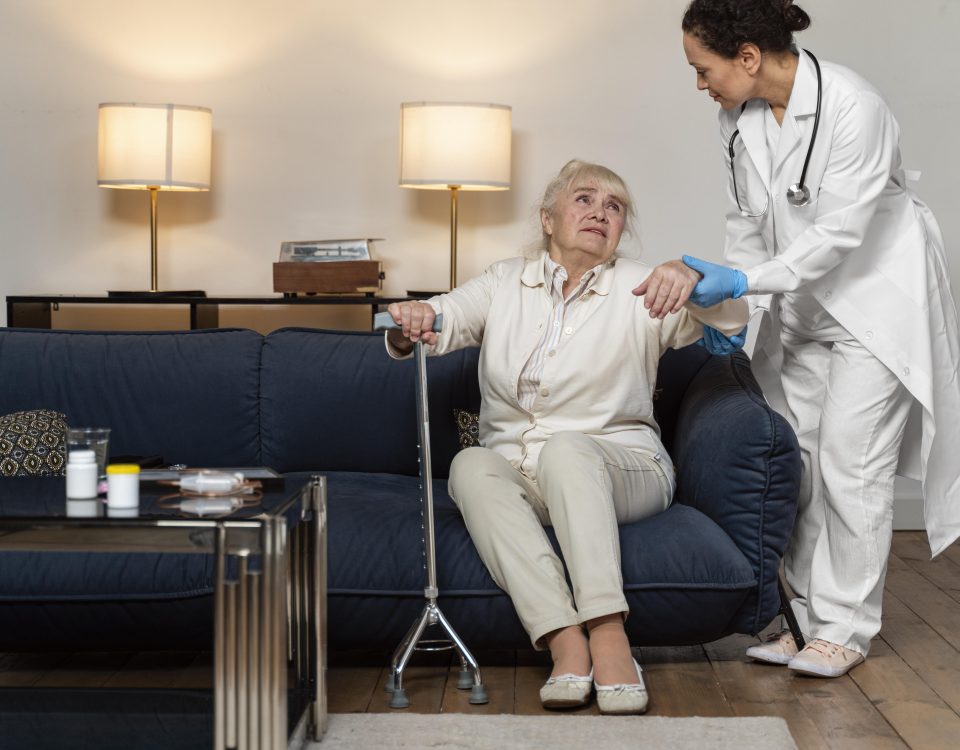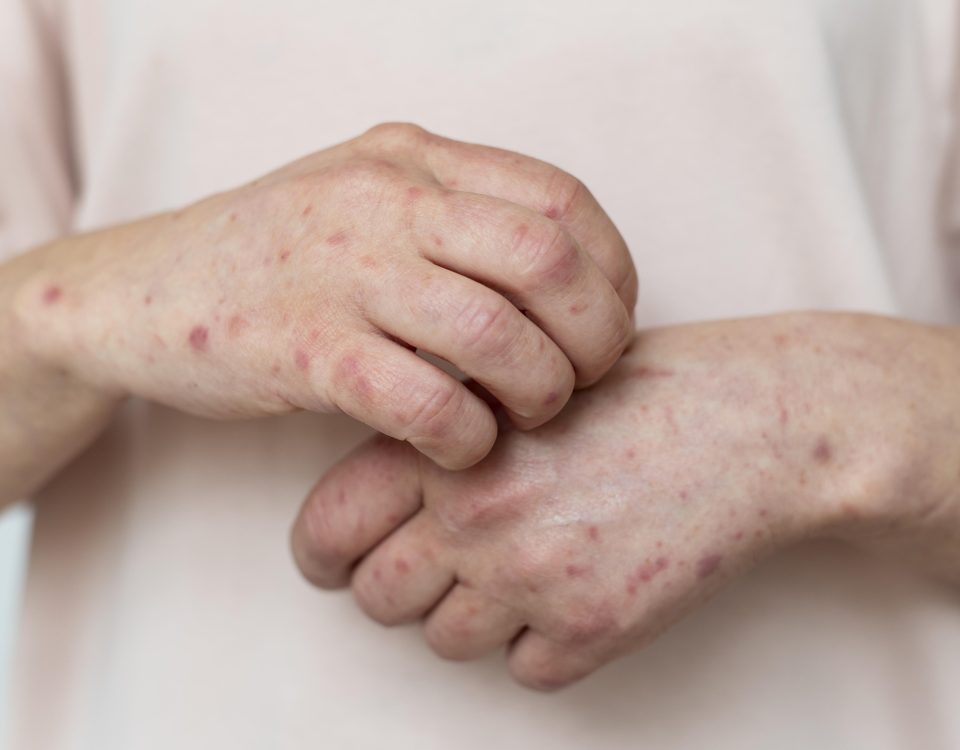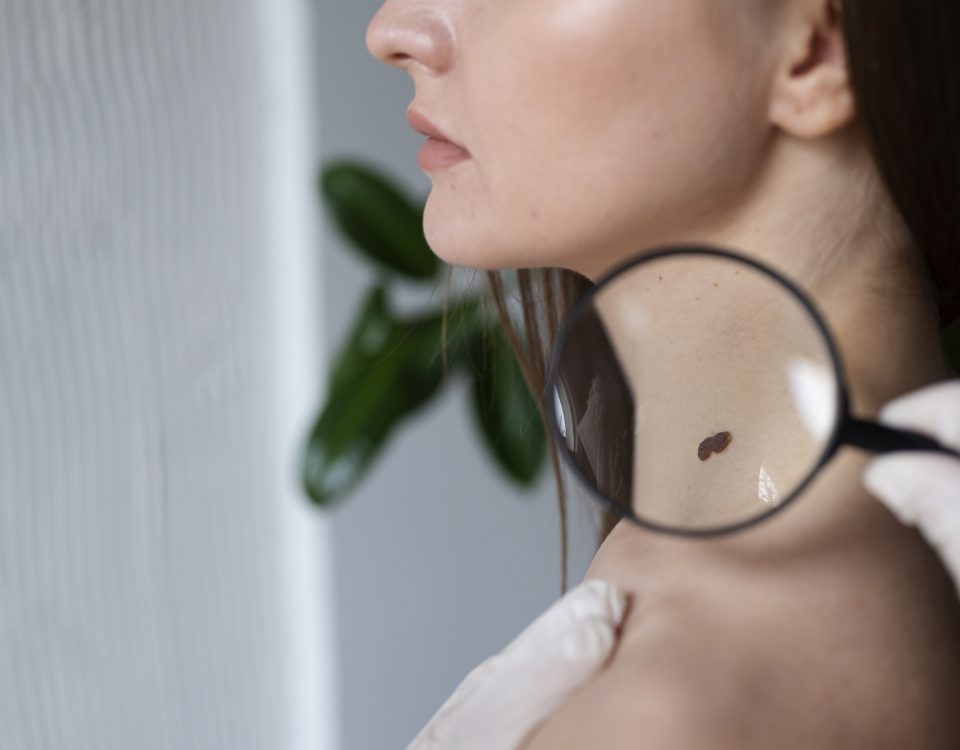
Does Laser Skin Rejuvenation Effective for 12 Months
6 March 2025
What Is Melanoma?
18 March 2025What is Psoriasis?
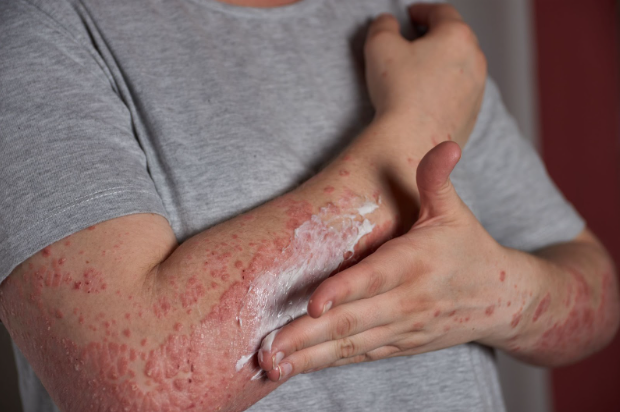
The autoimmune skin condition called psoriasis starts a skin cell cycle at an accelerated rate making for excessive skin cell accumulation on skin surfaces. This disease progression causes scaly surface patches along with inflammation that creates red skin appearance. The non-viral disease exists at any stage of life yet primarily affects adults.
Trust Bergen Premier Aesthetics for both professional treatment solutions and expert care.
Causes of Psoriasis
Experts say psoriasis starts due to a combination of inherited elements and immune system irregularities although the complete trigger remains unknown. Key contributors include:
- When the immune system develops dysfunction it mistakenly attacks healthy skin cells leading to fast cell reproduction.
- Your risk increases for developing psoriasis when a blood relative suffers from this condition.
- Triggers – Certain factors can initiate or worsen psoriasis, such as:
- Stress
- Infections
- Cold weather
- Skin injuries
- Certain medications
- Alcohol and smoking
Types of Psoriasis
There are several types of psoriasis, each with unique symptoms:
Plaque Psoriasis (Psoriasis Vulgaris)
- About 80 to 90 percent of patients with psoriasis develop this form of the condition.
- Raised skin areas called plaques appear on skin surfaces along with inflammation and scales because of psoriasis.
- Common areas: Scalp, elbows, knees, and lower back.
Guttate Psoriasis
- Tiny skin opacities in the form of drops manifest across the body.
- Bacterial infections starting with strep throat tend to trigger this psoriasis condition.
- Common in children and young adults.

Inverse Psoriasis
- Psoriasis in skin creases manifests as red irritated smooth areas that appear on armpits under the breasts and surrounding genital areas.
- Worsens with friction and sweating.
Pustular Psoriasis
- The skin contains white pustules which produce pus as they are surrounded by red tissue.
- This condition exists across two modes: it affects distinct areas like hands and feet or spreads throughout the entire body.
Erythrodermic Psoriasis
- Medical professionals classify the severe life-threatening condition as a widespread redness, widespread shedding and painful form.
- Requires immediate medical attention.
Symptoms of Psoriasis
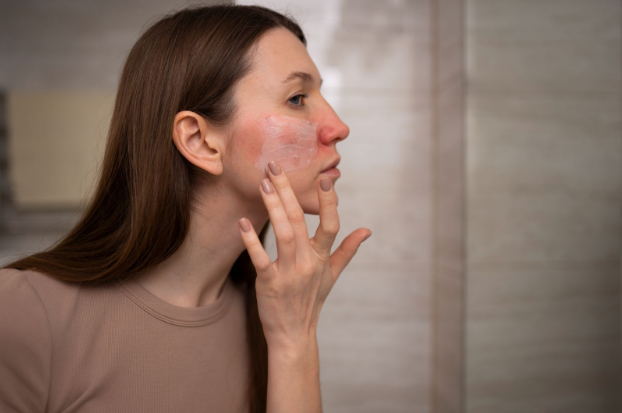
The intensity of psoriasis symptoms presents widely unique patterns between different people with the condition. Common symptoms include:
- Red patches of skin with silver-white scales
- Cracked dry skin often bleeds from its surface.
- Itching, burning, or soreness
- Thickened or ridged nails
- When accompanied by psoriatic arthritis patients experience painful swelling and inflammation in their joints.
Diagnosis of Psoriasis
A dermatologist can diagnose psoriasis through:
Physical examination – Identifying characteristic plaques and lesions.
Medical professionals test affected skin by taking small microscopic samples for diagnosis through skin biopsy.
Treatment Options for Psoriasis
Numerous treatment options exist to efficiently control psoriasis symptoms but doctors have not found a permanent solution to the condition.
Topical Treatments
- Skin treatments that contain corticosteroids work to decrease inflammation and fight itchiness.
- Vitamin D analogs (Calcipotriene and Calcitriol) function to decrease skin cell growth rate.
- The application of retinoids on the skin sparks cell regeneration along with reducing skin scaling.
- When applied topically salicylic acid supports the removal of skin scales while improving surface smoothness.
- Coal tar works by lowering inflammation alongside skin scaling.
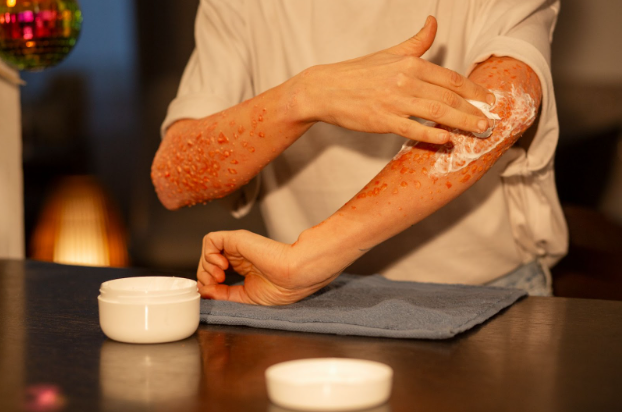
Phototherapy (Light Therapy)
- Ultraviolet B (UVB) light therapy operates to control skin cell development and minimize swelling effects.
- PUVA therapy (Psoralen + UVA light) – Effective for severe cases.
For patients looking to improve skin tone, texture, and reduce redness alongside medical therapy, Laser Genesis is a non-invasive treatment that supports skin rejuvenation and inflammation control.
Systemic Treatments (Oral or Injectable Medications)
- The immune system becomes the target of Biologics including Adalimumab, Etanercept and Infliximab to minimize inflammation.
- Patients receive Methotrexate which acts to decrease their immune reaction.
- Cyclosporine – Provides short-term relief for severe psoriasis.
Long-term psoriasis treatment requires acitretin which belongs to the retinoid drug group.
Lifestyle and Home Remedies for Psoriasis
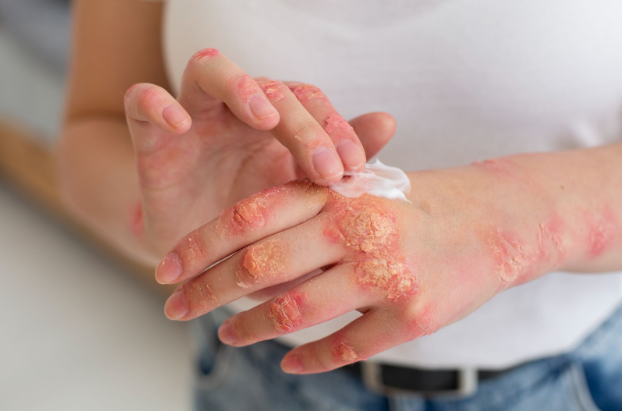
While medical treatments are essential, lifestyle changes can also help manage psoriasis effectively:
- Each day apply moisturizing products to stop dryness and limit scaling. For surface exfoliation and smoother skin texture, treatments like chemical peels may help manage buildup and flaking when recommended by your provider.You should select mild skin products along with gentle soaps in order to prevent skin irritation.
- You need to stay away from things that trigger your condition such as stress and alcohol consumption and smoking.
- Your psoriasis management will benefit from eating anti-inflammatory foods that comprise a healthy diet.
- Regular exercise should become part of your routine because it combats stress while lowering inflammation in the body.
Psoriasis and Mental Health
Psoriasis can have a significant psychological impact, leading to:
- People who struggle with both self-image and low self-worth
- Anxiety and depression
- Social isolation
Psychological support from dermatologists together with therapists and support groups helps patients manage mental health and live better.
Psoriasis vs. Other Skin Conditions
People sometimes mistake psoriasis for eczema or seborrheic dermatitis or fungal infections. Here’s how it differs:
- Psoriasis: Thick, scaly plaques with defined borders.
- Eczema: The inflamed skin shows itchiness but contains fewer scaly patches.
- Seborrheic dermatitis: Greasy, yellowish scales, often on the scalp and face.
- Fungal infections: The skin displays red scaly areas which develop clearing in the center.
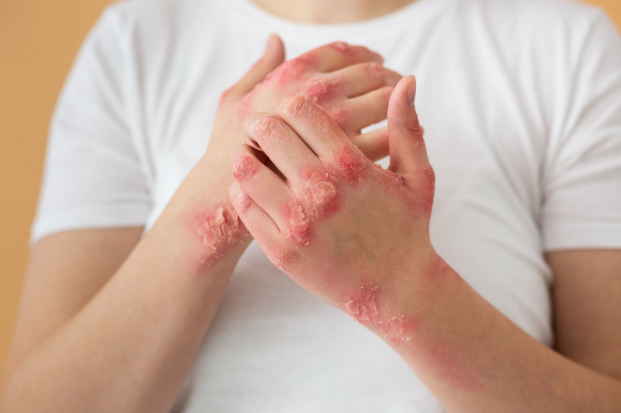
When to See a Doctor
- Severe or widespread skin lesions
- Persistent pain, itching, or discomfort
- Joint pain and stiffness (possible psoriatic arthritis)
- The body shows signs of infection through redness and swelling along with pus.
Your search for expert psoriasis advice and treatment should lead you to Bergen Premier Aesthetics.
Final Thoughts
The continuous nature of psoriasis requires proper medical care combined with personal modifications that help patients sustain both symptom control and excellent life quality. Contact your doctor to learn about specific psoriasis treatment options when psoriasis affects you or anyone you care about.
The professional skincare services together with treatment options are available at Bergen Premier Aesthetics.


